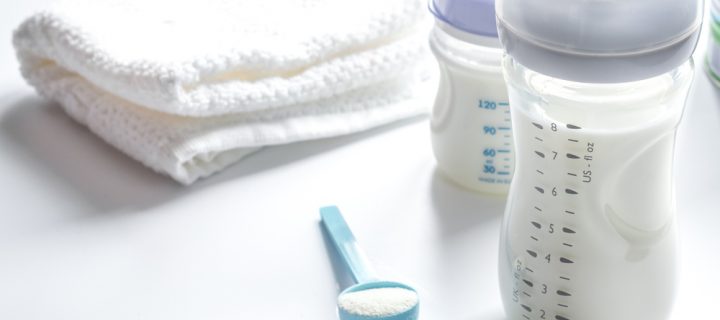Babies in the US have been hospitalized with bone deformities and growth problems as a result of homemade baby formula.
It can be an alluring vision. You’ve had a baby, you feel drawn to be the mom or dad of the century, everything is now organic, it’s all handmade, pesticide-free, natural fibers and nontoxic. If it’s not made of bamboo or grown at the local farm just an hour’s drive down a winding country road that pleasantly seems to have no end, it’s not in your basket or on your shelves.
When it comes to feeding your infant, however, if you’re not breastfeeding, it’s a good idea to resist “going green and local”.
Plainly put, don’t avoid the big brand names that make baby formula like they’re the plague. They aren’t. Resist the temptation to strike out on your own. Sure, maybe some babies have survived growing on homemade formula in history. Not many, however. That’s what wet nurses and aunties in the family with big milky boobies were for: feeding a child properly when a mom couldn’t.
The reason homemade baby formula is a bad idea is that babies need the proper nutrients to grow. Big companies might be destroying the planet as you read this with plastic products and waste, but they’re good at getting your baby exactly what they need to grow and thrive. This is true from one very specific reason. If they didn’t, they’d be taken to court.
The reason this is important to point out is that some people are making dangerous choices for their children.
Infants with bone deformities
What are some parents doing? Recent news reports shows that at least three infants in the US have been hospitalized because of homemade formula that didn’t have all the nutrients they need. These babies developed rickets as a result of the eating formula over many months. Rickets is a condition caused by a lack of vitamin D. It causes poor growth, soft bones, deformities, a curved spine, and pain in the bones. You can get vitamin D from the sun, but in North America, because of our indoor lifestyles and the waning of the sun in winter, vitamin D supplementation through food is necessary in many regions. A vitamin D deficiency isn’t something you want for your child. It’s also totally avoidable.
Related: Younger kids in the classroom have a more difficult future: study
According to the Centers for Disease Control and Prevention (CDC), to date, at least three babies have been hospitalized in the US for this reason. The children needed urgent medical care. Some couldn’t sit up when of the age to do so. All were extremely irritable, and at least one infant had to be resuscitated. X Rays showed all the babies had rickets. All were being fed an experimental alkaline diet of homemade formula made from things like sea moss, hemp seeds, and coconut water. The children were lacking vitamin D as well as calcium, and iodine. Bad news, and not at all necessary.
Where to buy regular, reliable baby formula
What should you feed your baby? Breast milk is the cheapest and healthiest way to feed your infant. Professionally made infant formula is also very effective at getting the right nutrients into your child. It’s sold in many major stores including places like Walmart, Walgreens, and your local grocery store. Both ways of feeding your baby are excellent and can allow your child to grow and thrive as they should.
For more information about baby formula click here. For information on how low income families in the US can get access to free formula and healthy food for kids, click here.
photo credits: 279photo Studio/Shutterstock.com











